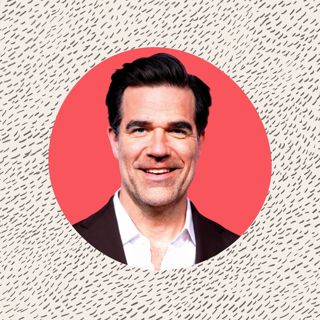
How Trump Lost Control of the Epstein Narrative
For the past two weeks, President Trump has been trying and failing to get his supporters to stop talking about Jeffrey Epstein.David Enrich, a deputy investigations editor for The New York Times, and Shawn McCreesh, a Times White House correspondent, explain why MAGA won’t let go of this scandal, how the president misread his own base — and what all this shows about the limits of Mr. Trump’s power. Subscribe today at nytimes.com/podcasts or on Apple Podcasts and Spotify. You can also subscribe via your favorite podcast app here https://www.nytimes.com/activate-access/audio?source=podcatcher. For more podcasts and narrated articles, download The New York Times app at nytimes.com/app.
21 Juli 28min

‘Modern Love’: How to Keep Love Alive, With Rob Delaney of ‘Dying for Sex’
When we meet Rob Delaney’s character, “Neighbor Guy,” in FX’s limited series “Dying for Sex,” he’s scarfing down a burrito in an elevator, dripping food on his face and the floor. But Delaney’s performance reveals that under Neighbor Guy’s messy exterior is a man capable of deep vulnerability and empathy.“Dying for Sex” follows a woman named Molly, played by Michelle Williams, who is dying of cancer and desperate to experience sexual pleasure before it’s too late. At first, Molly thinks Neighbor Guy is disgusting, but the two soon discover they make sense together, sexually and emotionally. Williams and Delaney received Emmy nominations for their roles.On this episode of Modern Love, Delaney tells host Anna Martin why exposing the messy and painful parts of ourselves to other people can be rewarding and hilarious. He talks about tending his own relationship and reads a Modern Love essay about a couple who decides to try some role play to avoid getting too comfortable with each other.For more Modern Love, search for the show wherever you get your podcasts. New episodes every Wednesday. Subscribe today at nytimes.com/podcasts or on Apple Podcasts and Spotify. You can also subscribe via your favorite podcast app here https://www.nytimes.com/activate-access/audio?source=podcatcher. For more podcasts and narrated articles, download The New York Times app at nytimes.com/app.
20 Juli 37min

'The Interview': Sandra Oh Knows What's Great About Middle Age
The actress discusses discrimination in Hollywood, what she’s learned about herself in her 50s and her iconic role on "Grey's Anatomy.” Subscribe today at nytimes.com/podcasts or on Apple Podcasts and Spotify. You can also subscribe via your favorite podcast app here https://www.nytimes.com/activate-access/audio?source=podcatcher. For more podcasts and narrated articles, download The New York Times app at nytimes.com/app.
19 Juli 41min

Congress Just Gave Away Its Power to Trump
Last night, President Trump achieved a major victory: persuading both chambers of Congress to cancel billions of dollars in spending that they had already approved.In the process, the Republican-led Congress is giving President Trump the power that it, and it alone, is supposed to have.Guest: Catie Edmondson, a congressional correspondent for The New York Times.Background reading: Congress approved a White House request to claw back $9 billion for foreign aid and public broadcasting, sending the measure to the president.Here’s where the cuts threaten access to PBS and NPR.For more information on today’s episode, visit nytimes.com/thedaily. Transcripts of each episode will be made available by the next workday. Subscribe today at nytimes.com/podcasts or on Apple Podcasts and Spotify. You can also subscribe via your favorite podcast app here https://www.nytimes.com/activate-access/audio?source=podcatcher. For more podcasts and narrated articles, download The New York Times app at nytimes.com/app.
18 Juli 25min

The Most Toxic Relationship in Washington
During an Oval Office meeting with congressional Republicans a few days ago, President Trump showed off the draft of a letter that would fire Jerome H. Powell, the chair of the Federal Reserve.It’s the latest chapter in a dysfunctional relationship that has major implications for the global economy.Guest: Colby Smith, who covers the Federal Reserve and the U.S. economy for The Times.Background reading: President Trump waved a copy of a draft letter firing Jerome H. Powell at a meeting in the Oval Office with House Republicans.Can Trump fire Powell? It’s likely that he lacks a case, legal experts say.For more information on today’s episode, visit nytimes.com/thedaily. Transcripts of each episode will be made available by the next workday. Photo: Tom Brenner/The New York Times Subscribe today at nytimes.com/podcasts or on Apple Podcasts and Spotify. You can also subscribe via your favorite podcast app here https://www.nytimes.com/activate-access/audio?source=podcatcher. For more podcasts and narrated articles, download The New York Times app at nytimes.com/app.
17 Juli 30min

Project 2025’s Other Project
During a congressional hearing yesterday, Republican lawmakers accused university leaders of failing to do enough to combat antisemitism on their campuses. That’s a claim that the university officials strongly rejected.The hearing was the latest attempt by Republicans to use what they see as the growing threat against Jews to their political advantage. And it reflects a plan that was first laid out by the Heritage Foundation, the same conservative think tank that produced Project 2025.That plan, known as Project Esther, may have once seemed far-fetched. Katie J.M. Baker explains how it has become a reality.Guest: Katie J.M. Baker, a national investigative correspondent for The New York Times.Background reading: Even before President Trump was re-elected, the Heritage Foundation, best known for Project 2025, set out to destroy pro-Palestinian activism in the United States. University leaders rejected Republican attacks, saying they were working to protect Jewish students but also free speech on their campuses.For more information on today’s episode, visit nytimes.com/thedaily. Transcripts of each episode will be made available by the next workday. Photo: Jared Soares for The New York Times Subscribe today at nytimes.com/podcasts or on Apple Podcasts and Spotify. You can also subscribe via your favorite podcast app here https://www.nytimes.com/activate-access/audio?source=podcatcher. For more podcasts and narrated articles, download The New York Times app at nytimes.com/app.
16 Juli 29min

Did the Texas Floods Have to Be This Deadly?
A little over a week after the devastating floods in Central Texas, the death toll has reached more than 130 people — and the search for the missing continues.In the aftermath of the disaster, there have been mounting questions about how local officials handled the critical hours before and after the storm. Today, we look at the missed opportunities that may have contributed to the growing tragedy — and whether anything more could have been done to save lives.Guest: Christopher Flavelle, a Times reporter covering how President Trump is transforming the local government..Background reading: Kerr County, where most of the deaths occurred, failed to secure a warning system, even as local officials remained aware of the risks and as billions of dollars were available for similar projects.Years before the floods, the Federal Emergency Management Agency had approved the removal of many Camp Mystic buildings from flood zones, records show.Eight-year-olds at camp, families in their R.V.s: These were some of the lives lost to the Texas floods.For more information on today’s episode, visit nytimes.com/thedaily. Transcripts of each episode will be made available by the next workday. Photo: Carter Johnston for The New York Times Subscribe today at nytimes.com/podcasts or on Apple Podcasts and Spotify. You can also subscribe via your favorite podcast app here https://www.nytimes.com/activate-access/audio?source=podcatcher. For more podcasts and narrated articles, download The New York Times app at nytimes.com/app.
15 Juli 29min

One Rural Doctor on the Cuts to Medicaid
When Republicans passed their big domestic policy bill just over a week ago, they kept making the same argument about sweeping changes to Medicaid: that the measures, including new work requirements, would encourage able-bodied adults to earn their health care, ultimately creating a fairer system for everyone. Critics said the opposite: they have predicted that millions of working people who need health care will lose it.The truth will emerge in rural and often Republican-voting areas where cuts to Medicaid funding will be felt most deeply. Natalie Kitroeff spoke to a family doctor in one of those places, western North Carolina, about what she thinks will happen to her patients.Guest: Shannon Dowler, a family physician and health advocate in western North Carolina.Background reading: In North Carolina, President Trump’s domestic policy law jeopardizes plans to reopen one rural county’s hospital — and health coverage for hundreds of thousands of state residents.The nonpartisan Congressional Budget Office predicted that the Senate’s version of Trump’s bill would mean that 11.8 million more Americans would become uninsured by 2034.For more information on today’s episode, visit nytimes.com/thedaily. Transcripts of each episode will be made available by the next workday. Photo: Kaoly Gutierrez for The New York Times Subscribe today at nytimes.com/podcasts or on Apple Podcasts and Spotify. You can also subscribe via your favorite podcast app here https://www.nytimes.com/activate-access/audio?source=podcatcher. For more podcasts and narrated articles, download The New York Times app at nytimes.com/app.
14 Juli 31min






















